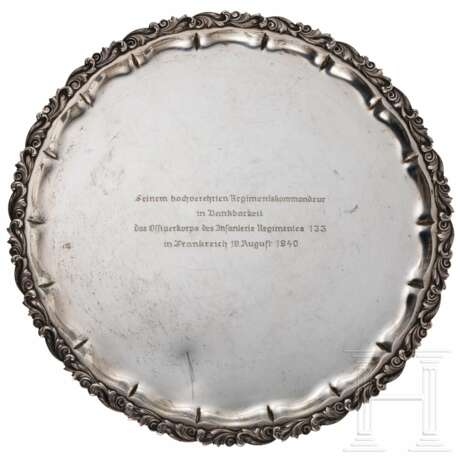General der Infanterie Rudolf von Bünau (1890 - 1962) - große Silberplatte, Geschenk des Offizierskorps des IR 133 zur Ritterkreuzverleihung an ihren Kommandeur 1940
07.11.2024 10:00UTC +02:00
Classic
Starting price
1000EUR € 1 000
| Auctioneer | Hermann Historica |
|---|---|
| Event location | Germany, Grasbrunn / München |
| Buyer Premium | 25 % |
Archive
The auction is completed. No bids can be placed anymore.

ID 1322745
Lot 2486 | General der Infanterie Rudolf von Bünau (1890 - 1962) - große Silberplatte, Geschenk des Offizierskorps des IR 133 zur Ritterkreuzverleihung an ihren Kommandeur 1940
Große, runde und von Hand gehämmerte Silberplatte mit erhabenen Blattranken auf der Fahne, im Zentrum des Spiegels feine Gravur "Seinem hochverehrten Regimentskommandeur in Dankbarkeit das Offizierskorps des Infanterie Regimentes 133 in Frankreich 19. August 1940". Oberseitig Feingehaltspunze "800 - Handgeschlagen", unterhalb der Widmung etwas verkratzt. Durchmesser 35 cm, Gewicht 1001 g.
Rudolf von Bünau trat 1909 dem 1. Württemberg. Grenadier-Regiment "Königin Olga" Nr. 119 bei, diente im Ersten Weltkrieg in verschiedenen Einheiten, wurde 1918 Hauptmann und in die Reichswehr beim IR 13 übernommen. Im Juli 1934 zum Oberstleutnant und im August 1936 zum Oberst befördert, wird er im November 1938 Kommandeur des IR 133, das er in den Polen- sowie Frankreichfeldzug führt, wofür er mit den Spangen zum EK II und EK I sowie am 15. August 1940 mit dem Ritterkreuz ausgezeichnet wird. Im September 1940 zum Generalnmajor befördert, wird er Kommandeur der 177. Division, wird im Juni 1941 in die Führerreserve versetzt und im Januar 1942 zum Kommandeur der 73. ID ernannt. Als Generalleutnant (Sept. 1942) erhält er im Januar 1943 das DKiG, übernimmt ab April 1944 die Führung des XI. Armeekorps und wird im Mai 1944 zum General der Infanterie befördert. Als Kommandierender General des XI. AK in der Ukraine wird er am 5. März 1945 mit dem Eichenlaub ausgezeichnet und ab April 1945 noch zum Verteidigungskommissar von Wien ernannt.
General der Infanterie Rudolf von Bünau (1890 - 1962) - a large silver plate, a gift of the officers of Infantry Regiment 133 on occasion of the Knight's Cross award to their commander in 1940
General der Infanterie Rudolf von Bünau (1890 - 1962) - a large silver plate, a gift of the officers of Infantry Regiment 133 on occasion of the Knight's Cross award to their commander in 1940
Große, runde und von Hand gehämmerte Silberplatte mit erhabenen Blattranken auf der Fahne, im Zentrum des Spiegels feine Gravur "Seinem hochverehrten Regimentskommandeur in Dankbarkeit das Offizierskorps des Infanterie Regimentes 133 in Frankreich 19. August 1940". Oberseitig Feingehaltspunze "800 - Handgeschlagen", unterhalb der Widmung etwas verkratzt. Durchmesser 35 cm, Gewicht 1001 g.
Rudolf von Bünau trat 1909 dem 1. Württemberg. Grenadier-Regiment "Königin Olga" Nr. 119 bei, diente im Ersten Weltkrieg in verschiedenen Einheiten, wurde 1918 Hauptmann und in die Reichswehr beim IR 13 übernommen. Im Juli 1934 zum Oberstleutnant und im August 1936 zum Oberst befördert, wird er im November 1938 Kommandeur des IR 133, das er in den Polen- sowie Frankreichfeldzug führt, wofür er mit den Spangen zum EK II und EK I sowie am 15. August 1940 mit dem Ritterkreuz ausgezeichnet wird. Im September 1940 zum Generalnmajor befördert, wird er Kommandeur der 177. Division, wird im Juni 1941 in die Führerreserve versetzt und im Januar 1942 zum Kommandeur der 73. ID ernannt. Als Generalleutnant (Sept. 1942) erhält er im Januar 1943 das DKiG, übernimmt ab April 1944 die Führung des XI. Armeekorps und wird im Mai 1944 zum General der Infanterie befördert. Als Kommandierender General des XI. AK in der Ukraine wird er am 5. März 1945 mit dem Eichenlaub ausgezeichnet und ab April 1945 noch zum Verteidigungskommissar von Wien ernannt.
Condition: II +
| Address of auction |
Hermann Historica Bretonischer Ring 3 85630 Grasbrunn / München Germany | ||||||||||||||
|---|---|---|---|---|---|---|---|---|---|---|---|---|---|---|---|
| Preview | |||||||||||||||
| Phone | +49 (0)89 5472 649 0 | ||||||||||||||
| Fax | +49 (0)89 5472 64999 | ||||||||||||||
| Buyer Premium | 25 % | ||||||||||||||
| Conditions of purchase | Conditions of purchase | ||||||||||||||
| Business hours | Business hours
|


